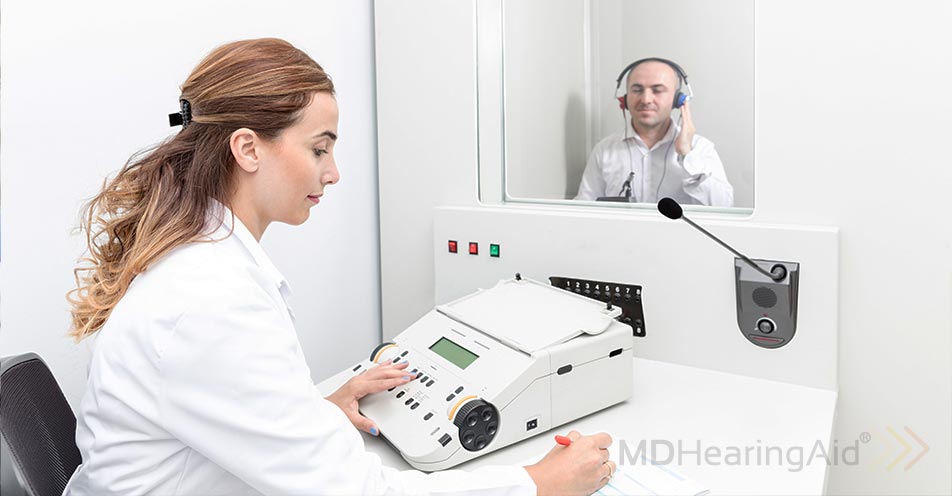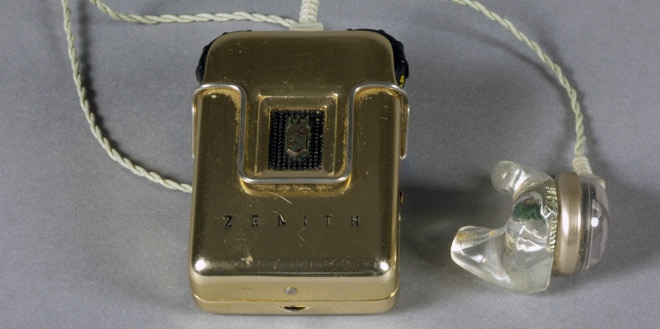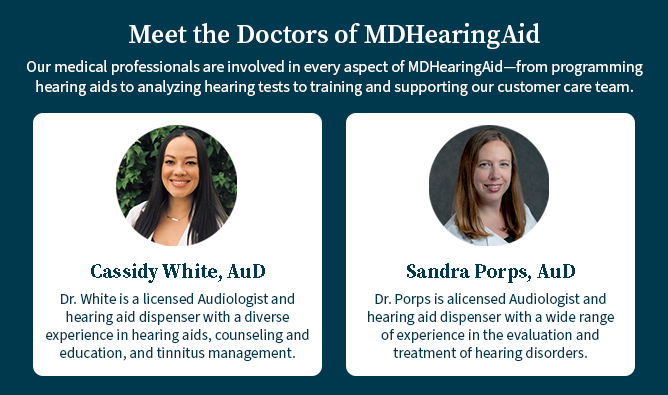Hearing is one of the most important of the five human senses. When your sensory nerves send signals to the brain, they’re interpreted as sound, sight, smell, taste, or touch. When one of those signals gets disrupted, such as in hearing loss, then finding ways to fix it is vital for one’s quality of life. This is where an audiologist comes into play.
The field of audiology is full of medical terms making it difficult to understand what’s what. We’ve broken down some of this information to help you understand the role of an audiologist and how they can help you maintain good hearing health:
- History of Audiology
- Audiologist: What They Are
- Audiologist: What They Do
- Audiologist: Training and Education
- Audiologist: Hearing Issues They Treat
- Differences Between Related Professions
- When You Should See an Audiologist
- MDHearing Audiologists
Brief History of Audiology
Around World War II, audiology as a discipline was born out of the need to address hearing loss. Thousands of WWII veterans suffered damage to their ears from loud noises. The U.S. Government and experts in deaf education, speech pathology, psychology, and other fields got together to help these veterans. They developed special programs for auditory training, testing, amplification, and rehabilitation.
Image Source: sciencehistory.org
Initially, these hearing loss programs were offered in military hospitals. By the 1950s–60s, hearing programs were available to the public at community-based centers and clinics. In the 1970s–80s, subspecialties emerged, including pediatric audiology, educational audiology, industrial audiology, cochlear implants, and balance disorders. The first vacuum tube hearing aids were heavy and large, about the size of a pack of cigarettes. They used a lot of batteries and weren’t very reliable. Then, the invention of the transistor helped shrink hearing aids down to the size of a lighter. Today, advances in technology have led to even smaller and higher-quality hearing aids, cochlear implants, and other devices.
What is an Audiologist?
Audiology is defined as “a branch of science dealing with hearing,” according to Merriam-Webster. The term comes from the Latin word audīre ("to hear") and the Greek word -logia (“a speaking, doctrine, theory, science”). The term audiologist is based on the Latin word audīre (“to hear”) and the Greek word -istes ("one who does or makes"). The American Academy of Audiology defines an audiologist as follows:
An audiologist is a person who, by virtue of academic degree, clinical training, and license to practice and/or professional credential, is uniquely qualified to provide a comprehensive array of professional services related to the prevention of hearing loss and the audiologic identification, assessment, diagnosis, and treatment of persons with impairment of auditory and vestibular function, and to the prevention of impairments associated with them.”
Throughout time, not only has audiology focused on measuring hearing but also on how hearing loss impacts one’s ability to communicate and socialize. In short, audiologists identify, assess, diagnose, and treat people with hearing and balance impairments. Next, we’ll learn a little more about all that they do to help patients with hearing issues.
What Does an Audiologist Do?
Depending on an audiologist’s training and credentials, they may play different roles in a patient’s road to healthy hearing. This includes everything from measuring hearing loss and dispensing hearing aids to designing hearing-loss prevention programs and researching hearing disorders.
Audiologists are like superheroes fighting off ear villains. An audiologist is trained to manage hearing and balance problems that occur in all ages from birth to adulthood. The following is a list of some of the main roles an audiologist may play:
- Identify hearing impairments
- Assess hearing loss and balance issues
- Diagnose disorders of the ears
- Prescribe hearing treatments
- Fit hearing aids, cochlear implants, and other devices
- Provide auditory rehabilitation
- Create programs to preserve hearing
- Research auditory and communication disorders
The first line of defense for any suspected hearing issue is a hearing test. When you take a hearing test, you’ll receive the results in what’s called an audiogram. An audiologist, like the ones at MDHearing, can help you interpret your audiogram and determine if you need treatment for hearing loss.
What Training and Education Are Required to Be an Audiologist?
Audiology is one of the fastest-growing fields in employment. In fact, employment for audiologists is expected to increase 13% from 2019 to 2029. Just for perspective, the average growth for other jobs is only 4%.
The field of audiology is regulated in all 50 states and the District of Columbia. While one can practice audiology with a master’s degree, a doctoral degree is necessary to gain national certification. Typically, due to its research component, a doctorate degree takes anywhere from four to eight years to complete.
To become an audiologist, the following education, training, and credentials are required:
- Master’s Degree in Audiology or Doctor of Audiology (Au.D.) from an accredited institution
- 36-week fellowship or year-long externship
- 400 hours of clinical practicum experience
- Passing of national Praxis Examination for state licensure with a minimum score of 600
- Continuing education credits required for license
- Certificate of Clinical Competence in Audiology (CCC-A) through the American Speech-Language-Hearing Association (ASHA)
- This optional certification requires a doctorate degree
- CCC-A is not mandatory nationally but may be required by some states and the military
- Voluntary professional certifications through the American Board of Audiology (ABA)
- Certificate Holder-Audiology Preceptor (CH-AP)
- Certificate Holder-Tinnitus Management (CH-TM)
- ABA Certification
- Pediatric Audiology Specialty Certification (PASC)
- Cochlear Implant Specialty Certification (CISC)
Although the future for audiologists looks promising, their total numbers are small as compared to other fields. Nevertheless, they pack a big punch when it comes to helping people hear. That’s because their training is very specialized.
What Hearing Issues Do Audiologists Treat?
When going through graduate school and clinical training, student audiologists gain so much knowledge about the ear and hearing. While some become generalists, many audiologists focus their intended career on a particular area. Some of the topics they learn include:
- Acoustics (sound)
- Anatomy and physiology
- Audiology theory and research
- Balance and dizziness disorders
- Counseling and teaching
- Electrophysiology
- Hearing aids and cochlear implants
- Neurology and psychophysics
- Sign language and communication
- Forensics and law
Because audiologists learn so much, they’re capable of diagnosing and treating different ailments in the ear. The most commonly treated hearing problems seen in an audiologist’s office include:
- Hearing loss
- Tinnitus (ringing in the ear)
- Balance problems
- Dizziness
- Wax in the ear
An audiologist may recommend treatment plans such as hearing aids, cochlear implants, assistive listening devices, and other technology. They also provide rehabilitative services to reduce the effect that hearing loss can have on one’s life. This is done by helping people relearn how to listen, communicate, use visual cues, etc. The aim of seeing an audiologist is to improve your quality of life, whether at work, in school, or around friends and family.
Are Audiologists Doctors? Can Audiologists Write Prescriptions?
People often think of an audiologist as their “Hearing Doctor.” Most audiologists have a doctorate—a Doctor in Audiology (Au.D.) degree—and in that sense, they’re considered a doctor. However, they’re not the same as a medical doctor or physician, which requires a Doctor of Medicine (M.D.) degree.
Like audiologists, doctors go through similar certification and licensure requirements in their field. The biggest difference is that only medical doctors can prescribe medications and perform surgery. This is why many audiologists work in partnership with ENTs (also called otolaryngologists), which are physicians that specialize in the ear, nose, and throat.
Audiologists can have their own independent private practice. Many opt to work in partnership with an ENT, whether in the physician’s own business or a hospital or clinic. Audiologists who specialize in audiology education work in public and private schools. Some work in rehabilitation facilities, long-term care facilities, and public health service units.
Audiologists aren’t limited to patient care. They can offer their expertise as consultants, teachers, and researchers. Some assist with the production of hearing technology; others help industrial companies protect their employees from loud noises. Lastly, you’ll also find audiologists in the armed services.
What’s the Difference Between Audiologists, Speech-Language Pathologists, and Related Practitioners?
Just as people think audiologists are medical doctors, many confuse them with other professions as well. Understanding the role of an audiologist and how it differs from others will help you know when to seek their help.
- Otologist – a medical doctor (M.D.) that specializes in the diagnosis and treatment of illnesses and injuries of the ear
- Audiometrist – a technician trained to conduct pure-tone hearing tests and fit hearing aids under the supervision of an audiologist
- Hearing Instrument Specialist (HIS) – a state-licensed specialist that evaluates hearing loss and fits hearing aids; also known as a Hearing Aid Dispenser
- Speech-Language Pathologist (SLP) – a state-licensed professional with a graduate degree who diagnoses and treats communication and swallowing disorders
When Should I See an Audiologist?
It’s important to have your ears screened regularly to ensure good hearing health. If you’re under 50 years of age, audiologists recommend testing your hearing every three years. If you’re over 50, you should get your hearing tested every year because aging often causes hearing loss. Those who work in a noisy environment should have their hearing tested more often.
Besides routine checkups, you should visit an audiologist if you think you may be losing your hearing. Some of the signs of hearing loss include:
- The sounds and voices you hear seem dull or muffled
- You often have to ask people to repeat themselves
- People complain that you turn the television up too loud
- You have a hard time keeping up with conversations in crowded and noisy places
- It’s difficult to understand what people are saying when you’re talking on the phone
- You hear annoying ringing sounds in your ears (tinnitus)
Does MDHearing Have an Audiologist on Staff?
Yes! MDHearing has a whole in-house team of hearing aid dispensers, hearing aid specialists, and licensed audiologists with doctoral degrees. Every hearing professional takes great care to program and test our hearing aids. For over a decade, their aim has always been to provide the highest standard of products for 500,000+ Americans. You can learn more about MDHearing’s leadership team and story to see who they are and why they do what they do.
Unlike hearing aid retailers, MDHearing cuts out the middleman to bring you medical-grade devices at budget-friendly prices. No more going back and forth to audiology appointments for testing, fitting, programming, and adjusting. All it takes is a simple email or phone call to connect with an audiologist. The first step is to get a hearing test so they can point you in the right direction.
Take Our Free Online Hearing Test
You can check your hearing right now with MDHearing’s free online hearing test. It only takes a few minutes, and you’ll get immediate results once you finish the test. Afterward, you can schedule time with one of our on-staff audiologists to discuss your results. If you prefer visiting an audiologist in person, then you may want to get a hearing test at a local hearing clinic.
No matter which way you go, we’re always available to answer questions about your hearing or that of a loved one. At MDHearing, we have specialists who can help you decide if our FDA-registered hearing aids will work for you. We offer affordable options for high-quality hearing technology, so don’t hesitate to contact us.
Test your hearing now and get instant results.
TAKE ONLINE HEARING TEST



